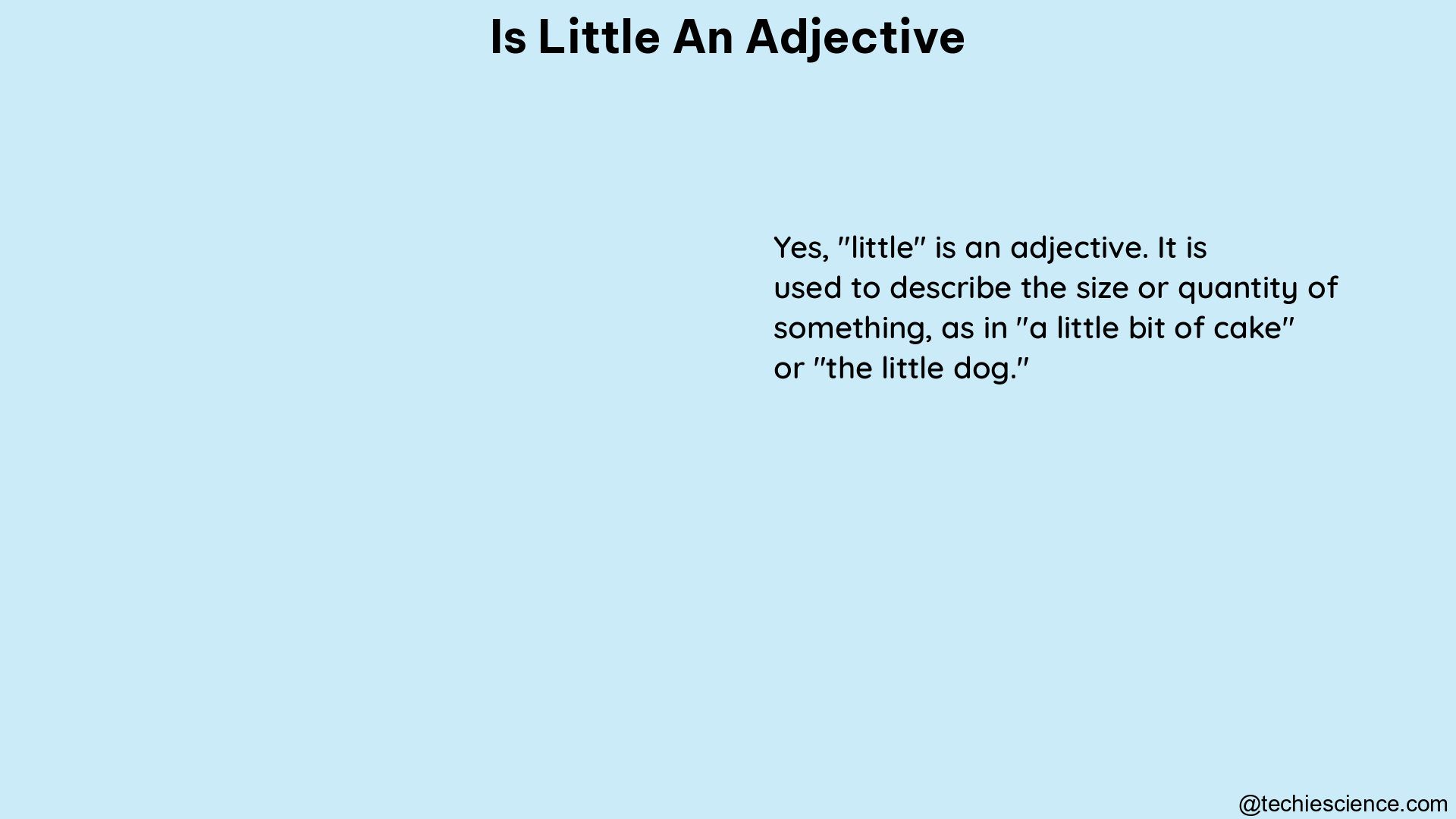Yes, “little” is an adjective that has several distinct meanings and usages in the English language. Let’s dive deep into the nuances of this versatile word and explore its various applications.
Defining “Little” as an Adjective
As an adjective, “little” is used to describe something that is small in size, amount, or degree. It can be applied to a wide range of nouns, from physical objects to abstract concepts. The key characteristics of “little” as an adjective are:
-
Small in Size or Extent: “Little” can be used to describe something that is diminutive or compact, such as “a little house” or “a little old lady.”
-
Young in Age: “Little” can also be used to indicate youth, as in “a little boy” or “a little girl.”
-
Not Important or Serious: In this sense, “little” suggests that something is not significant or crucial, as in “I can’t remember every little detail” or “it’s just one of life’s little mysteries.”
-
Small in Quantity or Degree: “Little” can denote a small amount or extent, such as “I have very little money” or “there’s little hope of a rescue now.”
-
Expressing Approval, Sympathy, or Dislike: “Little” can be used to convey a sense of endearment, condescension, or dislike, as in “the poor little thing” or “what a nasty little man.”
Grammatical Considerations

When using “little” as an adjective, it is important to consider its grammatical function and placement within a sentence. Here are some key points to keep in mind:
Placement of “Little” in a Sentence
“Little” can be placed before the noun it modifies, as in “a little house.” It can also be used after the noun, as in “the house is little.” The placement of “little” can affect the emphasis and meaning of the sentence.
Comparison and Superlative Forms
Like other adjectives, “little” can be used in comparative and superlative forms. The comparative form is “smaller,” and the superlative form is “smallest.” For example, “The little house is smaller than the big house,” or “The little girl is the smallest in the class.”
Quantifiers and “Little”
“Little” can be used in conjunction with quantifiers, such as “a little,” “very little,” or “too little.” These combinations can further refine the degree or amount being described. For instance, “I have a little money” versus “I have very little money.”
Idiomatic Expressions with “Little”
The word “little” is often used in idiomatic expressions, where its meaning goes beyond the literal definition. Examples include “a little bird told me,” “a little goes a long way,” and “a little of this, a little of that.”
Distinguishing “Little” from Other Adjectives
It’s important to differentiate “little” from other adjectives that describe size or quantity, such as “small,” “tiny,” “few,” and “some.” While these words may share some similarities, they each have their own distinct meanings and usages.
“Little” vs. “Small”
Both “little” and “small” describe something as being of a diminutive size, but “little” generally implies an even smaller size or extent than “small.” For example, “a small house” versus “a little house.”
“Little” vs. “Tiny”
“Tiny” suggests an even smaller size than “little,” conveying a sense of extreme diminutiveness. “A tiny kitten” is smaller than “a little kitten.”
“Little” vs. “Few”
“Few” is used to describe a small number or quantity, whereas “little” is more focused on the small size or extent of something. “I have a few dollars” versus “I have very little money.”
“Little” vs. “Some”
“Some” indicates a moderate or unspecified amount, while “little” suggests a small or insufficient amount. “I have some money” versus “I have little money.”
Practical Examples and Usage
To further illustrate the various applications of “little” as an adjective, let’s examine some real-world examples:
-
Small in Size or Extent: “The little cottage by the lake was charming.” “She had a little dog that followed her everywhere.”
-
Young in Age: “The little boy was excited to start his first day of school.” “The little girl giggled as she played with her toys.”
-
Not Important or Serious: “I can’t remember every little detail of the meeting.” “It’s just one of life’s little mysteries.”
-
Small in Quantity or Degree: “I have very little time to spare today.” “There’s little hope of finding the missing hiker in this storm.”
-
Expressing Approval, Sympathy, or Dislike: “The poor little thing was so scared.” “What a nasty little man he turned out to be.”
By understanding the nuances of “little” as an adjective, you can effectively use this versatile word to enhance your written and spoken communication, conveying precise meanings and evoking the desired emotional responses.
Reference:
- Cambridge Dictionary. (n.d.). Little. Retrieved from https://dictionary.cambridge.org/us/dictionary/english/little
- Merriam-Webster. (n.d.). Little. Retrieved from https://www.merriam-webster.com/dictionary/little
- Dictionary.com. (n.d.). Little. Retrieved from https://www.dictionary.com/browse/little
- Britannica Dictionary. (n.d.). Little. Retrieved from https://www.britannica.com/dictionary/little
- Oxford Learners Dictionaries. (n.d.). Little. Retrieved from https://www.oxfordlearnersdictionaries.com/us/definition/english/little_1

Hi…. I am Goutam Datta. I have completed a double M. A. in English and B. Ed. I am a creative writer. Currently, I am a part of the LambdaGeeks.